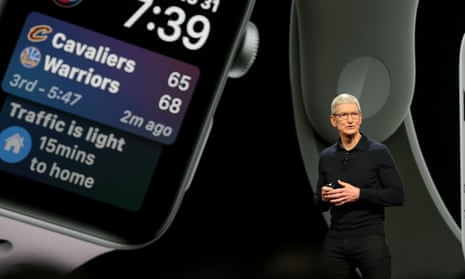Apple cut its sales forecasts for its key end of year period on Wednesday, citing the unforeseen “magnitude” of the economic slowdown in China.
Trading in the company’s shares was temporarily halted as Tim Cook, Apple’s chief executive, issued a letter to shareholders explaining the reason for the change. When selling started again, Apple shares fell by 7.45%, wiping $55bn (£44bn) off its value.
“While we anticipated some challenges in key emerging markets, we did not foresee the magnitude of the economic deceleration, particularly in greater China,” he said. He cited falling sales of iPhones, Mac computers and iPads.
The news sparked a “flash crash” in currency markets as investors rushed to less risky assets, with the Japanese yen soaring against most major currencies in a matter of seconds.
US stock futures pointed to another rough start on Wall Street, with Nasdaq E-mini futures down 2.2% and S&P 500 E-mini futures off 1.3%.
MSCI’s broadest gauge of Asia-Pacific shares outside Japan fell 0.4% after an early attempt at a bounce. Japanese markets were closed for holidays but Nikkei futures dropped 1.9%.
Shares in China and Hong Kong see-sawed between gains and losses as investors waited for Beijing to roll out fresh support measures for the cooling Chinese economy.
China’s central bank said late on Wednesday it was adjusting policy to benefit more small firms that are having trouble obtaining finance, in its latest move to ease strains on the private sector, a key job creator.
Apple’s statement was its first profit warning since 2002 and its first of the smartphone age. It is also one that will further rattle investors already worried about the slowing Chinese economy.
The unusual move came on a day when it was reported that factory activity in China contracted for the first time in 19 months in December. China’s economy has been pinched by the ongoing trade war with the US, which is spilling over into other Asian economies. China is Apple’s third largest market after the US and Europe.
“China’s economy began to slow in the second half of 2018. The government-reported GDP growth during the September quarter was the second lowest in the last 25 years,” wrote Cook.
“We believe the economic environment in China has been further impacted by rising trade tensions with the United States. As the climate of mounting uncertainty weighed on financial markets, the effects appeared to reach consumers as well, with traffic to our retail stores and our channel partners in China declining as the quarter progressed. And market data has shown that the contraction in Greater China’s smartphone market has been particularly sharp.”
Donald Trump and China’s president Xi Jingping agreed to a 90-day temporary ceasefire in their bitter trade war last month but as yet no long-term resolution appears close.
Despite these challenges, Cook said: “We believe that our business in China has a bright future.”
However, the company’s woes in the country have been exacerbated by a court decision that could potentially ban iPhone sales there. Chip maker Qualcomm won a preliminary injunction in December that would ban sales of older models that it claims violated its patents. Apple is appealing against the decision.
Apple said it now expects sales revenue of about $84bn, down from an earlier estimate of $89bn to $93bn. Analysts had been expecting revenues of about $91bn, according to market analyst FactSet.
Apple endured a bumpy 2018. In August it was the world’s biggest firm and became the first publicly traded company to be valued at $1tn. But it ended the year with its market value down close to 7% – its worst performance since the 2008 financial crisis. Apple is now the third largest public company behind Microsoft and Amazon.
Apple remains hugely profitable and is sitting on $237bn in cash. In November the company announced record sales and profits but iPhone sales were flat, heightening investor fears that its glory days are coming to an end. Sales of iPhones have so far failed to pick up despite Apple launching more variations of the device and analysts have worried that the market has become saturated and cheaper rivals are taking market share.
The price of a new iPhone can now exceed $1,000 in the US and £999 in the UK. Last year, Apple temporarily cut the price of replacement batteries for older models and more customers chose that option instead of upgrading their phones.
The iPhone, which launched in June 2007, has been an extraordinary success for Apple. More than one billion were sold between 2007 and 2017. While sales of its other devices and services such as iTunes and Apple Pay are growing sharply, the iPhone is still its most important product, accounting for 59% of its revenue in its previous quarter.
Apple’s poor performance was echoed by its fellow Faang companies – Facebook, Apple, Amazon, Netflix and Google – which all performed poorly in 2018. Their collective stumble helped drag down US stock markets, which had been driven to new highs by their rise.
Slowing iPhone sales have also compounded fears that Apple’s record-breaking run is coming to an end and China’s weakening economy worried investors that international markets would not pick up the slack.
